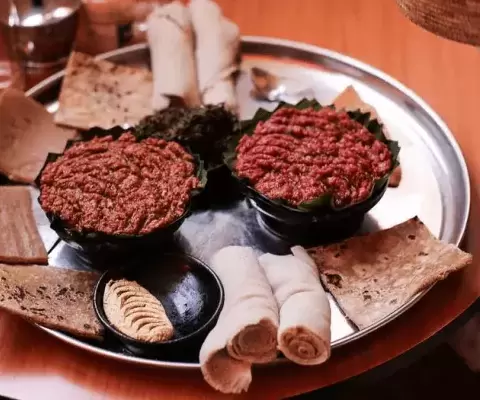Kuli-kuli is a popular West African snack that is beloved for its crunchy texture and savory flavor. Originating from Nigeria, kuli-kuli is made from ground peanuts that are roasted, seasoned, and shaped into bite-sized balls or sticks.
The peanuts are typically blended with spices such as chili powder, garlic powder, and salt, which add a delightful kick to the snack. Kuli-kuli is often enjoyed as a standalone snack, but it can also be crumbled and used as a topping in various dishes.
It is a favorite street food in Nigeria, often sold in markets and by vendors. With its satisfying crunch and nutty taste, kuli-kuli offers a delightful and flavorful snacking experience that has become a cherished part of West African cuisine.
Introduction
In today's culinary adventure, we're going to explore the vibrant flavors of West Africa with a classic snack called Kuli-Kuli. Originating from Nigeria, Kuli-Kuli is a deliciously crunchy treat made from ground peanuts and spices.
This flavorful delicacy not only satisfies your taste buds but also holds cultural and traditional significance.
Join me as we dive into the recipe, preparation method, and the cultural value of Kuli-Kuli.
Recipe
Ingredients
- 2 cups roasted peanuts
- 2 tablespoons ground ginger
- 1 tablespoon ground pepper
- 1 tablespoon ground crayfish (optional)
- 1 teaspoon salt
- 1 teaspoon bouillon powder (optional)
- Vegetable oil for frying
Special Equipment
- Food processor or blender
- Deep-frying pan or pot
- Slotted spoon
- Paper towels
Preparation Method
- Start by grinding the roasted peanuts to a fine powder using a food processor or blender. Ensure the peanuts are completely cool before grinding to avoid the oils from separating.
- In a large mixing bowl, combine the ground peanuts, ground ginger, ground pepper, ground crayfish (if using), salt, and bouillon powder (if desired). Mix well to evenly distribute the spices throughout the peanut powder.
- Slowly add water to the mixture, a little at a time, while stirring continuously. The goal is to achieve a thick, dough-like consistency. Be cautious not to add too much water, as it will make the mixture difficult to handle.
- Once the desired consistency is achieved, take a small portion of the dough and roll it into a ball between your palms. Repeat until you have used all the dough.
- Heat vegetable oil in a deep-frying pan or pot over medium heat. You want enough oil to submerge the Kuli-Kuli balls.
- Gently drop the Kuli-Kuli balls into the hot oil, ensuring not to overcrowd the pan. Fry them until they turn golden brown, about 5-7 minutes. Use a slotted spoon to remove the Kuli-Kuli from the oil and place them on paper towels to drain excess oil.
- Allow the Kuli-Kuli to cool completely before serving.
Serving Suggestions
Kuli-Kuli can be enjoyed in various ways. It is commonly consumed as a standalone snack, paired with a refreshing drink.
You can also crumble it into salads, sprinkle it over soups or stews, or even use it as a garnish for other traditional West African dishes. Its versatility allows for creativity in your culinary endeavors.
Nutritional Value
Kuli-Kuli is not only a flavorful snack but also a good source of nutrients. As it is primarily made from peanuts, it contains healthy fats, plant-based protein, fiber, and various vitamins and minerals.
However, due to its deep-frying cooking method, it is important to consume Kuli-Kuli in moderation as part of a balanced diet.
Cultural & Traditional Value
Kuli-Kuli holds immense cultural and traditional significance in West Africa, particularly in Nigeria. It is deeply rooted in the Hausa culture and is often associated with celebrations, festivals, and special occasions.
Kuli-Kuli also has historical ties to the Fulani people, who were known for their expertise in producing this beloved snack. Today, it is enjoyed across the country and beyond as a symbol of pride and culinary heritage.
Conclusion
Prepare to tantalize your taste buds with the unique flavors of Kuli-Kuli. With its crunchy texture, aromatic spices, and cultural significance, this West African delicacy is sure to become a favorite snack in your repertoire.
Whether enjoyed on its own or as a creative addition to other dishes, Kuli-Kuli offers a delightful culinary experience that connects us to the vibrant traditions of West Africa.














